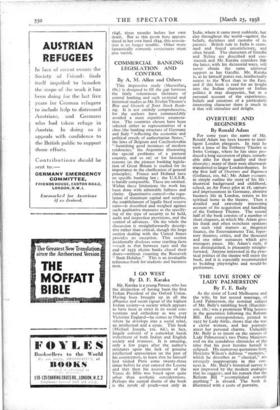I GO WEST By D. F. Kraka
Mr. Karaka is a young Parsee, who has the distinction of having been the first Indian President of the Oxford Union. Having been brought up in all the affluence and social rigour of the highest Indian societya society which appears to have been as strict in its social con- ventions and orthodoxy as was ever Victorian England—he comes to Oxford where he develops into a social rebel, an intellectual and a cynic. This book (Michael Joseph, los. 6d.), in fact, largely consists of a somewhat harsh indictment of both Indian and English society and manners. It is amusing, only a few pages after the author's strictures upon the lack of genuine intellectual appreciation on the part of his countrymen, to learn that he himself had visited Paris some twenty-three times before he ever entered the Louvre and that then his assessment of the Venus de Milo was based upon quite other than aesthetic considerations. _Perhaps the central theme of the book is -the revolt of youth—not only in India, where it came most suddenly, but also Lroughout the world—against the beliefs, doctrines and customs of its parents. British rule in India is exam- ined and -found unsatisfactory, and often brutal. The characters of Gandhi and Nehru are described and con- trasted, and Mr. Karaka considers that the latter with his dictatorial ways, will never Obtain the same universal support as has Gandhi. Mr. Karaka is, as he himself points out, intellectually nearer to the West than to the East, and if this book is read for an insight into the Indian character or Indian politics it may disappoint„ but as a personal account of the experiences, beliefs and emotions of a particularly interesting character there is much in it that will stimulate and delight. -










































































 Previous page
Previous page